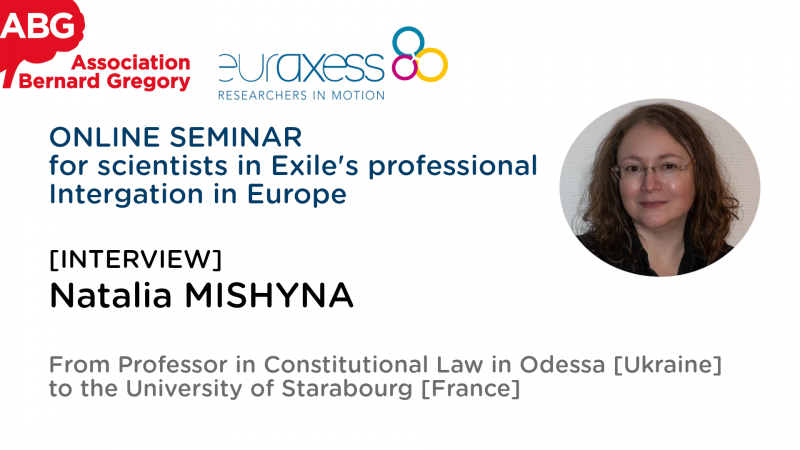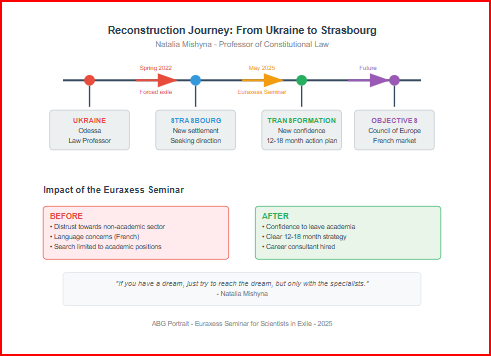

12/09/2025
We wanted to better understand the individual journey of our researchers, the difficulties they encountered, as well as the advice they wish to share with other scientists in exile. It is in this context that we conducted an interview with Natalia Mishyna, constitutional law professor from Odessa, Ukraine.
Forced into exile in spring 2022, Natalia found in Strasbourg not only a new place to live, but also the opportunity to rebuild her career and integrate into the European scientific community.

Before the seminar: Mistrust towards opportunities outside academia, particularly due to gaps in French language skills.
After the seminar: "I haven't noticed how and when, but I'm not afraid a lot to go out of academia now."
The seminar, explains Natalia, immediately resonated with her longstanding curiosity about career paths outside traditional academia. "Even if I would be in Ukraine, this would be enormously interesting for me," she shares, highlighting the universal appeal of exploring diverse professional pathways.
Natalia has developed a 12-18 month strategy:
Short term: International organizations (Council of Europe)
Medium term: French market in parallel with improving French language skills
Professional support: Hiring a career consultant
She now understands that while finding a "perfect match" may be a long journey, such positions exist. Consequently, she has expanded her job search beyond fellowships and postdoctoral opportunities to include NGO and corporate job listings.
Natalia's message to other researchers in exile facing uncertainty is clear and powerful: "Consult the specialists." She emphasizes that she hadn't realized the existence of such specialized support and the structured methodology available to help academics transition to other sectors.
"If you feel you need advice, look for the specialists and follow their advice," she encourages.
Beyond practical tools and methodologies, Natalia deeply appreciated the psychological support offered by the seminar. The team, all PhD holders who had made similar career transitions, provided a understanding and empathetic atmosphere.
"It was like talking to relatives, but nice relatives, the ones who can really help, the ones who really care," she shares with emotion.
The seminar, for Natalia, was truly a "life-changing experience". It instilled in her the confidence to pursue her dreams without compromise.
"If you have a dream, just try to reach the dream, but only with the specialists," she advises, crediting the seminar with providing her both the tools and the psychological strength necessary to take the leap.
Natalia's journey underscores the immense value of initiatives like the online Euraxess seminar, which not only equip scientists in exile with practical skills, but also offer the crucial emotional support and encouragement needed to rebuild their professional lives in a new environment.
This collaboration perfectly illustrates the European mission of ABG and its positioning as an expert in supporting researchers towards employment. The partnership with Euraxess allows ABG to:
Extend its expertise beyond French borders
Develop methodologies specific to researchers in forced mobility
Strengthen its position as a key player in professional integration in Europe
Create synergies with the European ecosystem of researcher support
The success of journeys like Natalia's validates ABG's approach and opens new perspectives for supporting European scientific talents in professional transition.
